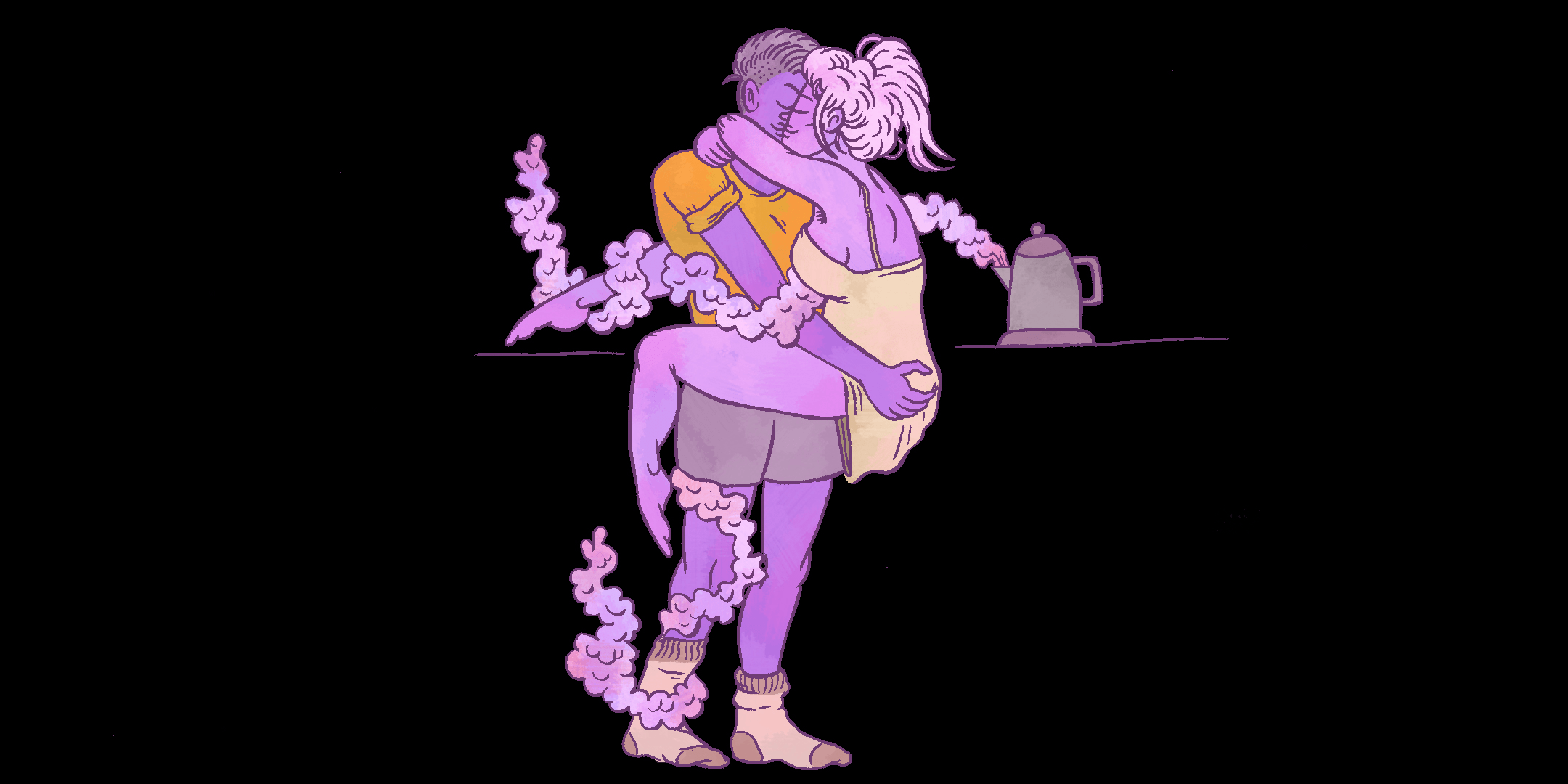Dear How to Do It,
My wife and I (heterosexual cis couple, early 30s) have been together for five years. We adore each other and we connect well on every level we can think of. Our communication is wonderful, and we seem just about perfectly compatible in every aspect of our lives from our work to sex. We are both fairly independent minded, but we support each other in all of our endeavors. In short, we try to have a real and equitable partnership, and we succeed better than I could have imagined was possible.
I may note that I had some sexual experience before we were married, but she was a virgin and a very inexperienced one at that. However, I’ve never felt she had any hang-ups in that regard, and she bought books and tried to educate herself as best she could without practical experience until we got married and could get on with it, so to speak. Practically, this means that I make most of the suggestions about what we should try in bed. We discuss everything, and we both feel happy that some things we try with enthusiasm, some things we try and they don’t work, and some things are off the table.
There is one exception. I have some dom tendencies. We have done a little light bondage and some spanking and she’s enjoyed those. We’ve talked a bit about taking it further, and she’s had some things on her off-the-table list, but she’s OK with trying some other things. But I’ve gotten in my own head about it. All my experiences with D&S were in a couple of casual relationships where the D&S play was the only part, and where my partners’ submissiveness was better developed than my dominance—that is to say, there was a lot of topping from the bottom. My issue is, then, that I’m having a difficult time reconciling my desires to dom with the equitable partnership we have outside the bedroom. I can tell myself that those two things are not mutually exclusive and that there are plenty of relationships where they co-exist healthily and happily, but I’m having a hard time putting that belief into practice. Our various levels of inexperience compound the problem, and in the end I’m left shrinking, which makes for a pretty sad dom, doesn’t it? I’m working on “fake it till you make it.†Any other ideas?
—Shy Dom
Dear Shy Dom,
I reached out to notable BDSM thinkers Sinclair Sexsmith and Valentin Somma for some perspective. They both agree that being concerned about equality in your daily life is a good sign. Sinclair starts by saying, “The thing about exploring dominance and submission is that it’s a psychological kink, so it’s very easy to get all up in our heads and over-thinky about it — hence what you said about shrinking. But there are some practical ways to keep playing while still being cautious, aware, and thoughtful about it.â€
Sinclair continues:
It’s not just that an equitable partnership CAN co-exist outside the bedroom, it is ESSENTIAL. People within D/s dynamics must come to each other with full agency, full ability to say what they want and don’t want, and trust that both partners are doing so. It is one of the big challenges of dominants to reconcile our deep beliefs that our partners are equal and we want a balanced, fair life together, with the desire to be controlling and dominating in our erotic play. For most of the dominants I know, that is an ongoing process, and it takes time, but it is possible to be very comfortable with it. I wrote a little about my own journey here. It may look like a paradox, but in fact they build to each other very nicely, because D/s is best when a dominant understands that they only hold authority because their partner gave it over to them, willingly, with consent and agency.
Valentin concurs, saying, “Equitable partnership and D/S dynamics are not just able to co-exist, they can reinforce each other.â€
As for sorting out your own tangled feelings, Valentin recommends journaling.
Take a journal and list anything that comes up when you think about stepping into your Dom. For instance, you might write things like “Men shouldn’t overpower women,†“My wife will stop loving me if she sees that part of me.†Just write what comes up for you, without any judgement. Time to be honest with yourself. Then turn each statement around, replacing it with an empowering affirmation. For instance, these could become: “Pleasurable consensual acts are empowering for everyone, including women,†“My wife loves me for who I am.†Find formulations that feel good for you, journal about them daily, and talk about them with your wife.
Sinclair has some affirmations of their own.
I love that you already have an off-the-table list and some things that she wants to try — that’s your key to your next steps. Get well acquainted with that list of things she wants to try. Make what I call a “palette of permissionâ€â€”a palette of activities, like a painter’s palette of different colors, that are not only on the table, but that she actively likes, enjoys, and wants. Then, mix it up! Try some from column A and some from column B; then try everything in column C. Try a little bit of X, Y, Z all in a row. There is a lot you can do if you just focus on the things that you both really like, and look for all the variations possible. After a while, you might want to check in on what it is you like, and what is on the palette of permission, and see if there are things you want to remove or add.
And Valentin and Sinclair both encourage further study. Valentin recommends workshops like those on offer by omrupani.org, pornographic videos like those of Foreplay Films, and the possibility of finding a more experienced dominant to coach you. Sinclair says:
I also highly suggest you start looking into other D/s resources, and you find some D/s community. If you haven’t already, take a look at The Topping Book and The Bottoming Book, or perhaps check out The Ultimate Guide to Kink by Tristan Taormino. As I write this, we’re still in the 2020 pandemic and sheltering in place, and there are dozens of D/s community groups who have moved their discussions, classes, and workshops online. It is so important to be connecting with other people who play with dominance and submission, to assure yourselves that the journey you’re going through is normal and that there are resources out there for when you get stuck.
— Stoya
Read the whole thing on Slate




